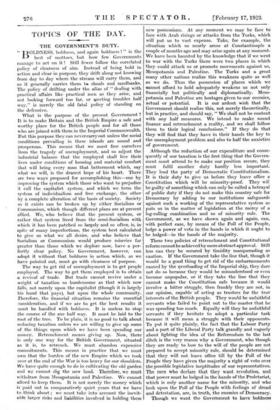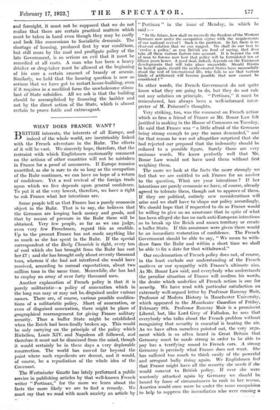TOPICS OF THE DAY.
THE GOVERNMENT'S DUTY. "?OLDNESS, boldness, and again boldness ! " is the best of mottoes,' but how few Governments manage to act on it ! Still fewer follow the correlated policy of clearness of aim. Instead of being bold in action and clear in purpose, they drift' along not knowing from day to day where the stream will carry them, and so it generally carries them to shoals and sandbanks. The policy of drifting under the alias of " dealing with practical affairs like practical men as they arise, and not looking forward too far, or meeting troubles half way," is merely the old fatal policy of standing on the defensive.
What is the purpose of the present Government ? It is to make Britain and the British Empire a safe and worthy place for the British people and for all those who are joined with them in the Imperial Commonwealth. But this purpose they can never carry out unless the social conditions prevailing in these islands are sound and prosperous. This means that we must free ourselves from the tragedy of unemployment, and so adjust the Industrial balance that the employed shall live their lives under conditions of housing and material comfort that will bring every man that betterment which, say what we will, is the dearest hope of his heart. There are two ways proposed for accomplishing this—one by improving the system which those who want to prejudice it call the capitalist system, and which we term the system of individualism and free exchange, the other by a complete alteration of the basis of society. Society as it exists can be broken up by either Socialism or Communism; which though different plans are at present allied. We, who believe that the present system, or rather that system freed from the semi-Socialism with which it has been patched so largely and so often, is, in spite of many imperfections, the system best calculated to give us what we all desire, and who believe that Socialism or Communism would produce miseries far greater than those which we deplore now, have a per- fectly clear policy. No Government, however, can adopt it without that boldness in action which, as we have pointed out, must go with clearness of purpose.
The way to get rid of unemployment is to .get people employed. The way to get them- employed is to obtain a revival of trade. But trade cannot revive under a weight of taxation so burdensome as that which now falls, not merely upon the capitalist (though it is largely his hand that pays), but upon the whole community. Therefore, the financial situation remains the essential consideration, and if we are to get the best results it must be handled with boldness. It is useless to stop the course of the axe half way. It must be laid to the root of the tree. To be plain, it is no good to talk about reducing taxation unless we are willing to give up some of. the things upon which we have been spending our money. Retrenchment means giving up. Now, there is only one way for the British Government, situated as it is, to retrench. We must abandon expensive commitments. This means in practice that we must awn that the burden of the new Empire which we took over at -the end of the War is too heavy for our shoulders. We have quite enough to do in cultivating the old garden and we cannot dig the new land. Therefore, we must withdraw from Mesopotamia and Palestine. We cannot afford to keep them. It is not merely the money which is- paid out in 'comparatively quiet years that we have to .think about ; we must take into account the inevit- able larger risks and liabilities involved in holding these new possessions. At any moment we may be face to face with Arab risings or attacks from the Turks, which will put us to vast expense. Take, for example, the situation which so nearly arose at Constantinople a couple of months ago and may arise again at any moment. We have been haunted by the knowledge that if we went to war with the Turks there were two places in which they could attack us or promote movements against us, Mesopotamia and Palestine. The Turks and a great many other nations realize this weakness quite as well as we do. Thus the possession of places which we cannot afford to hold adequately weakens us not only financially but politically and diplomatically. Meso- potamia and Palestine are hostages given to our enemies, actual or potential. It is our ardent wish that the Government should realize this, not merely theoretically, but in practice, and should say, " We shall not be content with any half measures. We intend to make sound finance and retrenchment a reality, and we shall follow them to their logical conclusions." If they do that they will find that they have in their hands the key to the unemployment problem and also to half the anxieties of government.
Although the reduction of our expenditure and conse- quently of our taxation is the first thing that the Govern- ment must attend to to make our position secure, they must fulfil another duty hardly less important. They lead the party of Democratic Constitutionalism. It is their duty to give us before they leave office a Constitution which will be minority-proof. They will be guilty of something which can only be called a betrayal of public duty if they do not make this country safe for Democracy by adding to our institutions safeguards against such a working of the representative system as puts us in the matter of legislation at the mercy of a log-rolling combination and so of minority rule. The Government, as we have shown again and again, can, with perfect ease, by means of the Poll of the People, lodge a power of veto in the hands in which it ought to be lodged—in the hands of the majority.
These two policies of retrenchment and Constitutional reform cannot be achieved by mere abstract approval. Still less can they be secured by timidity masquerading as caution. If the Government take the line that, though it would be a good thing to get rid of the embarrassments caused by the overloading of the Imperial ship, they dare not do so because they would be misunderstood or even become unpopular, or if they take the line that they cannot make the Constitution safe because it would involve a bitter struggle, then frankly they are not, in our opinion, capable of acting as trustees for the true interests of the British people. They would be unfaithful servants who failed to point out to the master that he was spending too much. Equally will they be unfaithful servants if they hesitate to adopt a particular task because it will mean a struggle with their opponents. To put it quite plainly, the fact that the Labour Party and a part of the Liberal Party talk grandly and vaguely about fighting the idea of the Referendum to the last ditch is the very reason why a Government, who though they are ready to bow to the will of the people are not prepared to accept minority rule, should be determined that they will not leave office till by the Poll of the People they have given the majority a right of veto over the possible legislative ineptitudes of our representatives. The men who declare that they want revolution, and that power must be lodged in the hands of the Proletariat, which is only another- name for the minority, and who look upon the Poll of the People with feelings of dread and detestation, are, in truth, the enemies of Democracy.
Though we want the Government to have boldness and foresight, it must not be supposed that we do not realize that there are certain practical matters which must be taken in hand even though they may be costly and look like concessions to Socialistic demands. The shortage of housing, produced first by war conditions, but still more by the mad and profligate policy of the late Government, is so serious an evil that it must be remedied at all costs. A man who has been a heavy drinker or drug-taker must be allowed at the beginning of his cure a certain amount of brandy or arsenic. Similarly, we hold that the housing question is now so serious that we have got to restart house-building, even if it requires in a modified form the unwholesome stimu- lant of State subsidies. All we ask is that the building should be accomplished by financing the builder and not by the direct action of the State, which is almost certain to prove futile and extravagant.











































 Previous page
Previous page